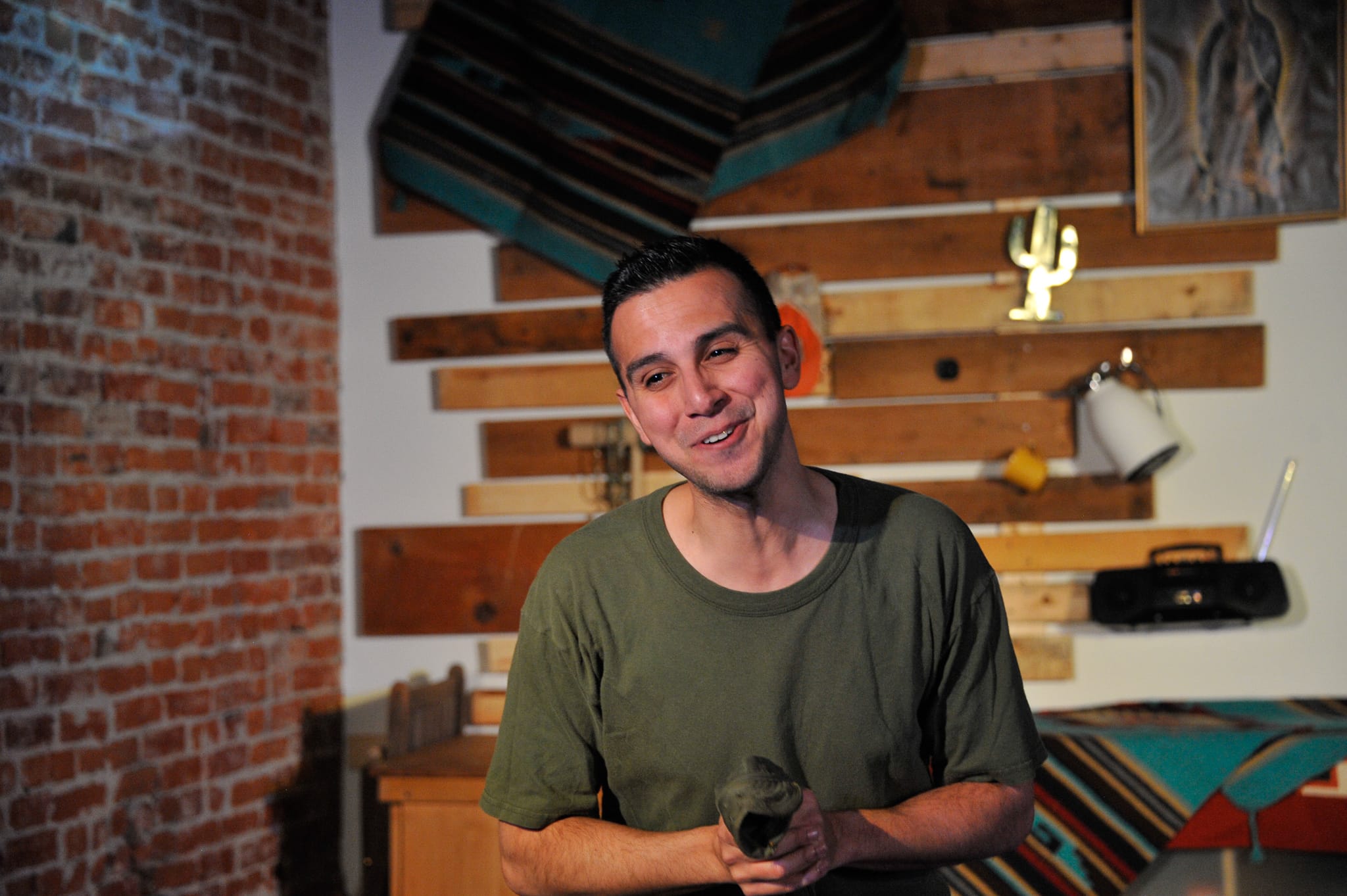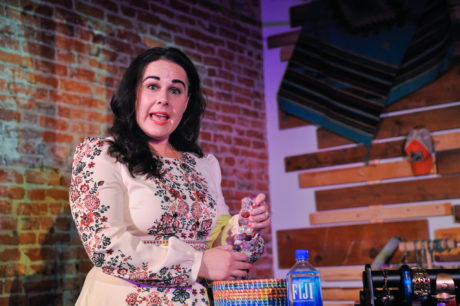Arresting, provocative, and hauntingly relevant, 14 by playwright José Casas weaves a tale of sixteen characters living or born in Arizona who express their divergent views about immigrants and immigration. Casas presents not only the stereotypical narratives from white US citizens, but he also surprises with points of view that challenge any belief that immigrants themselves cohere around the issue of immigration. The play works on a visceral level as Casas humanizes immigration and challenges “illegal” as a term to describe human status.

Casas’ play is based on the May 2001 discovery of the deaths of fourteen immigrants whom coyotes abandoned in the Arizona desert. Rather than attempting to convey the horror of dying in a 117-degree environment without shelter or water, Casas addresses the living. How do the living make sense of immigration vis-à-vis their lives?
Through a series of monologues and soliloquies, Casas unveils the tension in the debate on immigration. The opening scene between Roger Tate (Tom Howley), a hardware store owner, and Marta Ramirez (Cristina Sanchez), a secretary, rips open the trope of lynching as Tate’s son and six other teenagers jump two Mexican boys because of their alleged inappropriate contact with a white teenage girl. This is a tale reminiscent of the lynching of Emmett Till. Tate touts his son’s status as a football player and his status as an upstanding citizen while denigrating the lives of the two Mexican boys by showing no empathy or even entreating the plausibility of his son’s guilt.
Ramirez conveys the other side of the story. When the police investigate the teenagers who committed the crime, they find steroids, white power paraphernalia, and guns in their backpacks. Both actors Howley and Sanchez convey the depths of their beliefs without ever exchanging a word with each other. The interior monologues convey a dynamism that dialogue may have diminished.
From the opening to the last scene, Casas presents a bevy of characters with opinions about immigration. From a divorced and unemployed mother whose son is killed in a car accident by an illegal immigrant; to a Hispanic state senator advocating acculturation and decidedly anti-immigration; to a Bosnian refugee and doctor who draws striking similarities between Bosnians during war and the immigrants she treats in her hospital; to a rancher who shoots immigrants who wander on his property at night; to a reverend who puts water barrels in the desert because he is doing God’s work by saving lives, all of these characters convey narratives that give us pause. In each of the sixteen characters, the pro- or anti-immigration narrative becomes personal.
While all the actors are excellent, Lalo Medina stands out. He deftly portrays the Hispanic state senator (Omar Castillo); a biracial actor (Matthew “Mateo” Logan) who elides his Hispanic name and heritage, and plays up his perceived whiteness because of discrimination in the film industry; a soldier (José Reynosa) whose best friend dies in combat in Iraq and questions the efficacy of a Hispanic fighting for freedom abroad when freedom escapes him at home; a law student (Antonio Loera) who addresses racism and microaggressions in academia toward Black and brown students as well as the case law surrounding reverse discrimination; and an obrero (Oscar Garcia) who speaks Spanish to convey his trials and tribulations in the US as a day laborer.
Of particular note also is Meredith Garagiola who portrays Dr. Snezena Kuftinic, a refugee from Bosnia, with an authenticity that speaks to Garagiola’s excellent ear for accent and dialect.
Casas’s decision to write the lines for characters Luz Ortiz (Cristina Sanchez) and Oscar Garcia (Lalo Medina) in Spanish explores the extent to which audiences are bilingual and questions who the audience is for US theater. This is an effective way to challenge our assumptions about theater and language. How much does the audience lose when it does not understand Spanish and there are no subtitles? Does this matter?

Led by Director Lauren Patton and Associate Director Chelsea Radigan, Theatre Prometheus brings Casas’s play to life at DC’s Caos on F. Set Designers Eric McMorris and Daniel Mori make use of a small space by extending the stage and props into the audience. With repositioning, a desk, credenza, and rolling butcher block transform into offices, a boutique, a hardware store, a ranch, a living room, and the outdoors. Blue water/agua barrels are inconspicuously situated in the house.
Sound Designer Denise Rose sets the mood before curtain with covers of Bruno Mars’ “Uptown Funk” and Chaka Khan’s “Ain’t Nobody” with a salsa beat emphasizing the universality of music as language. Projection Designer Nitsan Scharf and Lighting Designer E-hui Woo keep the audience on track by displaying the name, occupation, and location of each character on the brick wall of the set. The wall also serves as the canvas for a painting by the character Alex Franco (played by Cristina Sanchez).
14 jars the senses in a way that makes us question our presumptions about the lives of immigrants and those persons living in border towns. In the end, the character Reverend Clay Nash (Tom Howley) entreats both the US and Mexico to work together to save lives, for who wants to drink hot water in the desert even when water can be found?
Running Time: 2 hours and 25 minutes, with a 15-minute intermission.
14, presented by Theatre Prometheus, plays through May 12, 2019, at Caos on F, 923 F Street NW, Washington, DC. For tickets, go online.




